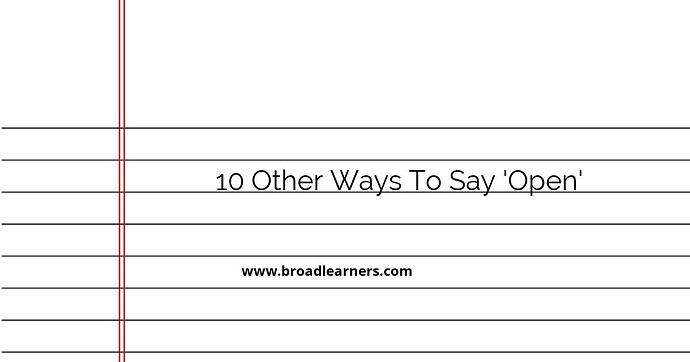When it comes to expressing the concept of 'open,' there are numerous alternatives that can be used to convey the same meaning. Here are 10 other ways to say 'open':
- Unlocked
- Accessible
- Available
- Unsealed
- Wide open
- Not closed
- Free
- Ready for use
- Open-ended
- Transparent
Let's explore each alternative in more detail:
1. Unlocked
'Unlocked' refers to something that is not secured or fastened, allowing easy access or entry.
Example: The door to the office is unlocked, so feel free to come in.
2. Accessible
'Accessible' means that something is easily reached or entered.
Example: The information is accessible to all employees on the company's intranet.
3. Available
'Available' indicates that something is ready to be used, obtained, or accessed.
Example: The meeting room is available for booking.
4. Unsealed
'Unsealed' suggests that something is not closed or sealed shut.
Example: The envelope arrived unsealed, raising concerns about its contents.
5. Wide open
'Wide open' describes something that is completely open, with no barriers or restrictions.
Example: The park gates are wide open, inviting visitors to explore.
6. Not closed
'Not closed' simply means that something is not shut or closed off.
Example: The window is not closed, and a breeze is coming in.
7. Free
'Free' indicates that something is unrestricted or not constrained.
Example: The concert is free for all attendees.
8. Ready for use
'Ready for use' suggests that something is prepared and available for immediate utilization.
Example: The new software update is ready for use by all employees.
9. Open-ended
'Open-ended' refers to something that has no clear or definite ending or limit.
Example: The project has an open-ended timeline, allowing for flexibility.
10. Transparent
'Transparent' indicates that something is clear, open, and easily understood.
Example: The company prides itself on its transparent communication with employees.
These alternatives provide you with a variety of options to use instead of 'open,' allowing you to add more depth and variety to your vocabulary.
Did I miss anything? Respond below
